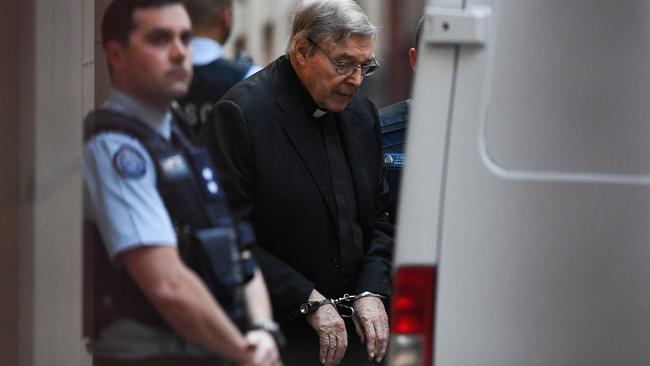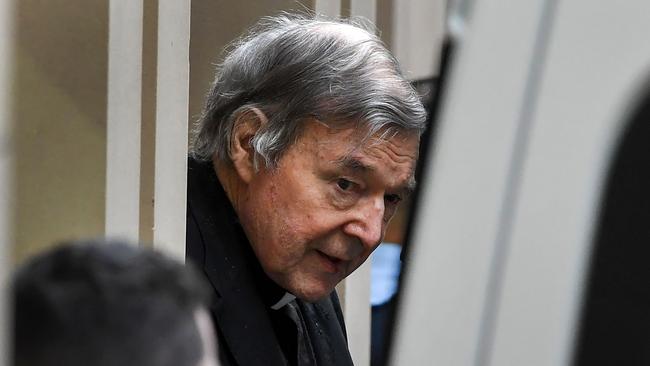George Pell kicks off last shot at freedom in High Court
The length of time George Pell spent on the steps of St Patrick’s Cathedral during his post-mass routine is emerging as a central pillar in the disgraced cardinal’s fight for freedom.

Police & Courts
Don't miss out on the headlines from Police & Courts. Followed categories will be added to My News.
How long did George Pell spend on the steps of St Patrick’s Cathedral after mass?
That single unanswered question has emerged as central to the convicted cardinal’s fight for freedom.
Much of today’s High Court hearing focused on the issue with Bret Walker, SC, arguing Pell routinely spent 10 or more minutes on the steps after mass.
Mr Walker told the court if it was accepted that this occurred, it would have been impossible for him to offend.
For four and a half hours Mr Walker spelled out Pell’s appeal arguments, discussing evidence and acute legal points at length, before a full bench of the court.
But the court kept coming back to Pell’s post-mass routine, and whether or not he would have had the time to commit the offences of which a jury found him guilty.
Pell was convicted of sexually assaulting two choir boys, while Archbishop of Melbourne, in the sacristy of St Patrick’s Cathedral after mass in the 1990s.

His appeal against the Victorian Court of Appeal majority decision to uphold his convictions is his final bid to prove his long maintained innocence.
The state’s most senior judges, Supreme Court justice Anne Ferguson and Court of Appeal president Chris Maxwell, found it was open to the jury to find the assaults took place.
“The jury were not bound to have a reasonable doubt,” they found.
But Mr Walker stridently argued they were wrong to do so saying their “piecemeal” approach wrongly concluded that a list of compounding improbabilities, described by Pell’s team as impossible, were indeed not impossible.
That sent “the inquiry off in a terribly damaging wrong route,” he argued.
Sources close to Pell emerged from court confident at his prospects of overturning his convictions.
University of Melbourne law professor Jeremy Gans said Mr Walker routinely had the court on side.
“They didn’t challenge what seemed to be very bold statements by him about the flaws in the Victorian Court of Appeal judgment and in the case,” Prof. Gans said.
Mr Walker argued the Court of Appeal majority misunderstood significant evidence, and that on a proper understanding of the evidence Pell could not have been convicted.
“And (the High Court) didn’t challenge (him),” Prof. Gans said.
“To be clear, they don’t have to challenge, so the significance is here trying to work out why wouldn’t they challenge,” he said.
“It’s hard to think of bad reasons for Pell in them not challenging.”
Much was made about the weight the majority in the Court of Appeal placed upon the credibility of the witnesses.
Mr Walker argued the majority allowed their belief in the credibility of the witness to overshadow other critical evidence.
“The whole matter is not believing beyond reasonable doubt the complainant’s credibility. That to which beyond reasonable doubt attaches is the proposition of guilt on the whole of the evidence,” he said.
In November, the court refrained from ruling on the special leave application, instead taking the rare step of referring the matter to a full bench of the court.
That issue has not been specifically addressed.
Supporters and critics of Pell travelled from interstate for the hearing, with some clashing outside court.
Pell, who was said to be optimistic about his chances of appeal ahead of the hearing, was not in court.
He is expected to receive a phone call briefing later tonight.
Victorian Director of Public Prosecutions Kerri Judd, QC, will respond to the Pell’s submissions tomorrow.
READ MORE
THE VICTIM’S STORY IN HIS OWN WORDS
FALLEN PELL SPENDS FIRST NIGHT BEHIND BARS
